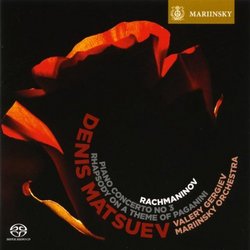The gem here is a scintillating Paganini Rhapsody, a total d
Santa Fe Listener | Santa Fe, NM USA | 02/10/2010
(5 out of 5 stars)
"The previous Mariinsky releases have concentrated on unusual repertoire. Here, as a change up, they offer very familiar piano showpieces by Rachmaninov. Thanks to the fall of the Soviet empire, Russian conductors and pianists have flooded the world with far more of Rachmaninov's music than it merits. So, can the starry Denis Matsuev and the masterful Gergiev outshine dozens of competitors who also have these pieces in their blood? Early in his career Matsuev released a CD that was an homage to Horowitz, but his reading of the Rach Three (as it was dubbed in the movie "Shine") is anti-Horowitz: serious, reflective, often relaxed, with many expressive pauses, sometimes in the first movement coming to a standstill. That may sound like the prelude to disparaging this performance, but actually it's refreshing to hear how such a refined and restrained approach, abetted by Gergiev's equal gravity, adds stature to a party piece that I long ago tired of.
Matsuev's technique isn't merely brilliant and powerful. He can handle any shading at any speed, making the finger-busting passages sound fluid, like pearls dropping from the sky. He's more musical than the piece itself, and so is Gergiev. They remove any taint of trashiness. D -- despite his aristocratic manner, Rachmaninov was tempted by the tawdry and by empty displays of note-spinning. This is a great reading for non-fans of the Rach Three like me. The proportion of clattery junk is blessedly low, as it was with Volodos under Levine.
I've heard Matsuev give an eye-opening performance of the Paganini Rhapsody, a much better piece. His secret was that he found a way to turn each variation into a miniature tone poem. He does the same here. Gergiev starts out with a bold statement of the famous theme, and his soloist enters immediately with delicate filigree to announce that this is going to be a scintillating, often witty reading that takes full advantage of Rachmaninov's mastery of piano tone (not that anyone has ever surpassed his magical touch when it comes to performance). Together, Gergiev and Matsuev find a dlightful variety in the score. I can't think of a previous modern reading that even comes close.
Also, the days of bad recording seem to be past in Russia. Both piano and orchestra are given superlative sound."


 Track Listings (28) - Disc #1
Track Listings (28) - Disc #1